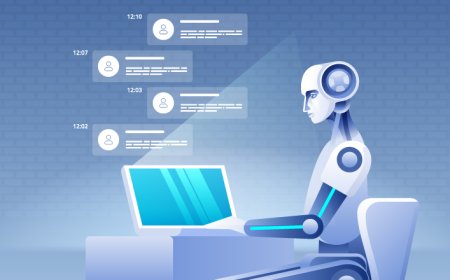Future-Proofing Careers: Essential Skills in Emerging Tech
Learn how to future-proof your career with essential skills for emerging tech. Explore in-demand technical and soft skills, career paths, and upskilling strategies.

Introduction to the Importance of Future-Proofing Careers
In today's rapidly evolving job market, future-proofing your career has become more important than ever. With emerging technologies transforming industries at an unprecedented pace, staying relevant and competitive requires continuous learning and adaptation. This article will guide you through understanding emerging technologies, why future-proofing is crucial, essential skills needed, and strategies to stay ahead in the tech-driven world.
1. Understanding Emerging Technologies
a. What Are Emerging Technologies?
Emerging technologies are innovations that are still developing and have the potential to significantly impact various industries. Examples include Artificial Intelligence (AI), blockchain, the Internet of Things (IoT), and quantum computing. These technologies are not just buzzwords; they are reshaping how we live, work, and interact.
b. The Evolution of Technology and Its Impact on Jobs
Historically, technological advancements have always shaped careers. From the Industrial Revolution to the Digital Age, each wave of innovation has created new jobs while making others obsolete. Understanding this evolution helps us anticipate future changes and prepare accordingly.
c. Current Trends in Emerging Tech
Today, key technologies driving change include AI, blockchain, IoT, and quantum computing. AI is revolutionizing data analysis and decision-making, blockchain is transforming financial systems, IoT is connecting devices globally, and quantum computing promises to solve complex problems faster than ever before.
2. Why Future-Proofing Careers Is Crucial
a. The Rapid Pace of Technological Change
Technology is advancing at a breakneck speed, making it essential to adapt continuously. Companies are integrating new tools and systems rapidly, requiring employees to stay updated with the latest developments.
b. Automation and Job Displacement
Automation is reshaping many jobs, particularly those involving repetitive tasks. While this can lead to job displacement, it also creates new opportunities. Understanding automation's role helps in preparing for these shifts.
c. The Demand for Tech-Savvy Professionals
As industries become more tech-driven, the demand for skilled workers who can navigate these technologies is growing. Being tech-savvy is no longer a bonus; it's a necessity for career growth.
3. Essential Skills for Careers in Emerging Tech
a. Technical Skills
Mastering technical skills is fundamental. This includes proficiency in programming languages like Python and Java, data analysis tools, and cloud computing platforms. These skills form the backbone of many tech roles.
b. Soft Skills
While technical skills are crucial, soft skills are equally important. Effective communication, adaptability, and problem-solving abilities are essential for thriving in dynamic work environments.
c. Digital Literacy
Understanding and navigating digital tools and platforms is vital. Digital literacy ensures you can effectively use technology to enhance productivity and innovation.
4. In-Demand Technical Skills in Emerging Tech
a. Artificial Intelligence and Machine Learning
AI and ML are transforming various fields, from healthcare to finance. Understanding the basics of AI, ML, and their applications can open up numerous career opportunities.
b. Blockchain Development
Blockchain technology is revolutionizing sectors like finance and supply chain management. Skills in smart contracts, cryptocurrencies, and decentralized systems are highly sought after.
c. Cybersecurity Expertise
In a digital-first world, protecting systems and data is paramount. Cybersecurity experts are in high demand to safeguard against threats and ensure data integrity.
d. Data Science and Analytics
Data is the new gold. Harnessing data for insights and decision-making requires skills in data science and analytics. These skills are crucial for roles in business intelligence and research.
e. Cloud Computing and DevOps
Building, deploying, and managing scalable systems is essential for modern businesses. Skills in cloud computing and DevOps are critical for ensuring efficient and reliable operations.
5. Soft Skills for Future-Proofing Careers
a. Adaptability and Resilience
Staying flexible in dynamic work environments is key. Adaptability and resilience help you navigate changes and bounce back from setbacks.
b. Critical Thinking and Problem-Solving
Tackling complex challenges in tech-driven roles requires strong critical thinking and problem-solving skills. These abilities help you make informed decisions and find innovative solutions.
c. Collaboration and Teamwork
Working effectively in interdisciplinary teams is crucial. Collaboration and teamwork ensure that projects are completed efficiently and successfully.
6. Emerging Career Paths in Technology
a. AI and Robotics Specialists
Roles in building intelligent systems and automation are on the rise. AI and robotics specialists are in demand across various industries, from manufacturing to healthcare.
b. Blockchain Developers and Analysts
Career opportunities in decentralized finance and systems are growing. Blockchain developers and analysts are essential for creating secure and transparent systems.
c. Green Tech Innovators
Jobs at the intersection of technology and sustainability are becoming more prevalent. Green tech innovators focus on developing eco-friendly technologies and solutions.
d. Virtual and Augmented Reality Developers
Opportunities in gaming, education, and healthcare are expanding. VR and AR developers create immersive experiences that enhance user engagement and learning.
7. Upskilling and Reskilling Strategies
a. Leveraging Online Learning Platforms
Platforms like Coursera, edX, and Udemy offer a wealth of courses to upskill and reskill. These platforms provide flexible learning options to fit your schedule and needs.
b. Attending Bootcamps and Workshops
Bootcamps and workshops offer intensive training in coding, data, and AI. These programs can fast-track your skills and prepare you for tech roles quickly.
c. Earning Industry Certifications
Certifications in cloud computing, cybersecurity, and more can boost your credentials. Earning these certifications demonstrates your expertise and commitment to continuous learning.
d. Participating in Hackathons and Projects
Gaining practical experience through hackathons and projects is invaluable. These events provide networking opportunities and hands-on learning experiences.
8. The Role of Lifelong Learning in Career Growth
a. Staying Updated on Industry Trends
Following news, podcasts, and thought leaders in tech keeps you informed about the latest developments. Staying updated helps you anticipate changes and adapt proactively.
b. Building a Growth Mindset
Embracing challenges and continuous improvement is key. A growth mindset encourages you to learn from failures and seek new opportunities for growth.
c. Networking in Tech Communities
Joining meetups, forums, and professional groups helps you build meaningful connections. Networking in tech communities can open doors to new opportunities and collaborations.
9. Challenges in Future-Proofing Careers
a. Keeping Up with Technological Changes
Staying relevant amidst rapid advancements can be challenging. Strategies like continuous learning and staying updated on industry trends can help you keep up.
b. Financial and Time Constraints
Balancing career development with personal responsibilities can be tough. Prioritizing your time and resources effectively is crucial for managing these constraints.
c. Overcoming Skill Gaps
Bridging the gap between current abilities and future demands requires effort. Identifying your skill gaps and working on them through upskilling and reskilling can help you stay competitive.
10. The Importance of Personal Branding in Tech Careers
a. Building an Online Presence
Leveraging platforms like LinkedIn, GitHub, and personal portfolios can enhance your visibility. Building an online presence showcases your skills and achievements to potential employers.
b. Showcasing Your Skills
Sharing projects and achievements can attract opportunities. Showcasing your skills effectively communicates your expertise and value to the tech industry.
c. Networking Effectively
Creating meaningful connections in the tech industry is essential. Effective networking can lead to collaborations, mentorship, and career advancement opportunities.
11. Case Studies: Success Stories in Emerging Tech Careers
a. Transitioning from Non-Tech to Tech Roles
Many individuals have successfully transitioned from non-tech to tech roles by upskilling. Their stories highlight the importance of continuous learning and adaptability.
b. Innovations by Young Tech Professionals
Young tech professionals are making breakthroughs in emerging technologies. Their innovations demonstrate the potential of new ideas and fresh perspectives in the tech industry.
c. Women Breaking Barriers in Tech
Women are leading in technology, breaking barriers and inspiring others. Their stories showcase the importance of diversity and inclusion in driving innovation.
10. Key Takeaways for Future-Proofing Careers
In summary, future-proofing your career in emerging tech requires a combination of essential skills and strategies. Adaptability, continuous learning, and personal branding are key to thriving in the tech-driven world. Embracing change and staying proactive in career development will help you stay ahead.
Conclusion
Future-proofing your career in the tech-driven world is not just about staying relevant; it's about embracing change and continuous growth. By understanding emerging technologies, developing essential skills, and staying proactive, you can navigate the rapidly evolving job market successfully. Embrace the opportunities that emerging tech offers and stay committed to lifelong learning to future-proof your career.
Frequently Asked Questions (FAQ)
1. What does future-proofing a career mean?
Future-proofing a career involves developing skills and strategies to stay relevant and competitive in a rapidly changing job market, particularly in the face of emerging technologies.
2. Why is future-proofing important in today's job market?
Future-proofing is important because technological advancements are reshaping industries at an unprecedented pace. Staying updated with these changes ensures that you remain employable and can adapt to new roles and responsibilities.
3. What are emerging technologies?
Emerging technologies are innovative developments that are still in the process of growth and have the potential to significantly impact various industries. Examples include Artificial Intelligence (AI), blockchain, the Internet of Things (IoT), and quantum computing.
4. What technical skills are essential for careers in emerging tech?
Essential technical skills include proficiency in programming languages, data analysis, cloud computing, AI and machine learning, blockchain development, cybersecurity, and DevOps.
5. Why are soft skills important in tech careers?
Soft skills like communication, adaptability, problem-solving, critical thinking, and teamwork are crucial because they enable effective collaboration, innovation, and resilience in dynamic work environments.
6. How can I develop digital literacy?
You can develop digital literacy by familiarizing yourself with various digital tools and platforms, taking online courses, and practicing hands-on projects that involve using technology effectively.
7. What are some emerging career paths in technology?
Emerging career paths include roles in AI and robotics, blockchain development, green tech innovation, and virtual and augmented reality development. These fields offer numerous opportunities across various industries.
8. How can I transition from a non-tech to a tech role?
Transitioning from a non-tech to a tech role involves upskilling through online learning platforms, attending bootcamps and workshops, earning industry certifications, and gaining practical experience through projects and hackathons.
9. What are the benefits of earning industry certifications?
Earning industry certifications can boost your credentials, demonstrate your expertise, and make you more competitive in the job market. Certifications in areas like cloud computing and cybersecurity are particularly valuable.
10. What are some effective upskilling and reskilling strategies?
Effective upskilling and reskilling strategies include leveraging online learning platforms, attending bootcamps and workshops, earning industry certifications, and participating in hackathons and projects.
11. How can I stay updated on industry trends?
You can stay updated on industry trends by following news, podcasts, and thought leaders in tech, joining tech communities and forums, and attending industry conferences and webinars.
12. What is the role of lifelong learning in career growth?
Lifelong learning is essential for career growth because it ensures continuous skill development and adaptation to new technologies and industry changes. It fosters a growth mindset and opens up new opportunities for advancement.
13. What are some challenges in future-proofing careers?
Challenges include keeping up with rapid technological changes, managing financial and time constraints, and overcoming skill gaps between current abilities and future demands.
14. How can I overcome skill gaps?
You can overcome skill gaps by identifying areas where you need improvement, taking relevant courses, earning certifications, and gaining practical experience through projects and internships.
15. How can I balance career development with personal responsibilities?
Balancing career development with personal responsibilities requires effective time management, prioritizing tasks, and leveraging flexible learning options like online courses and part-time programs.
16. Why is personal branding important in tech careers?
Personal branding is important because it helps you stand out in a competitive job market, showcases your skills and achievements, and builds a professional network that can lead to new opportunities.
17. How can I build an effective online presence?
You can build an effective online presence by creating and maintaining profiles on platforms like LinkedIn and GitHub, sharing your projects and achievements, and engaging with tech communities through forums and social media.
What's Your Reaction?








































